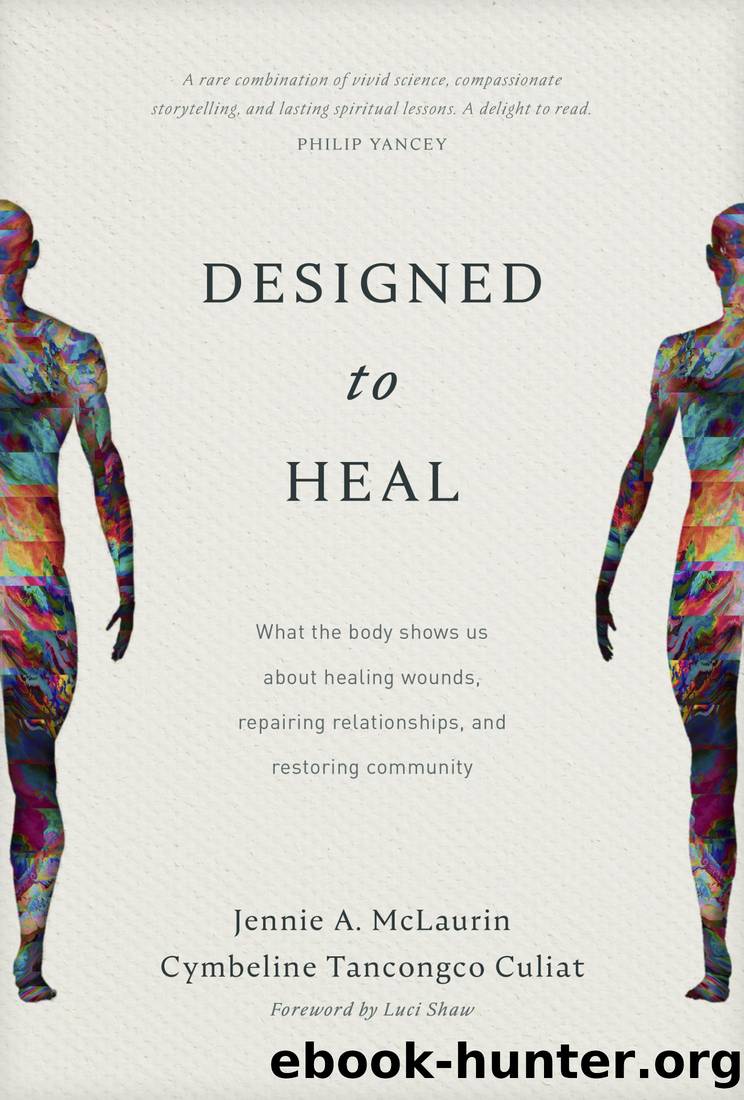Designed to Heal: What the Body Shows Us About Healing Wounds, Repairing Relationships, and Restoring Community by Jennie A. McLaurin & Cymbeline Tancongco Culiat

Author:Jennie A. McLaurin & Cymbeline Tancongco Culiat [McLaurin, Jennie A. & Culiat, Cymbeline Tancongco]
Language: eng
Format: epub
Tags: healing, Religion, Self-Help, Counseling & Recovery, Christian Ministry, Motivational & Inspirational, Health & Fitness, RELIGION / Christian Ministry / Counseling & Recovery, HEALTH & FITNESS / Healing
ISBN: 9781496447791
Google: mLgxEAAAQBAJ
Publisher: Tyndale House Publishers, Inc.
Published: 2021-11-15T23:49:37.954812+00:00
Keep the wound boundaries clean
Boundaries are odd things. Many are sites of contention rather than healing. We make boundaries to decide who is in and who is out. We separate and take sides. When we own property, our boundary lines tell us how much space we have between our neighbors, who are only welcome on our side of the line if we invite them. As parents, we tell our children not to cross that line! When a therapist says someone has poor boundaries, it is not a compliment. Human boundaries are about ownership, rights, and personal identity.
The natural inclination is to think of unpleasant restrictions when we think of boundaries. It is even like being bound. Rather than enjoying our boundary lines as places of refuge and safety, we often see our boundary lines as limitingâplaces of challenge, fear, and conflict. We operate from a sense of scarcity, wanting more. Wars are fought over boundary lines. Walls are built. Captives are taken.
But we can see boundaries either as hemming us in or as giving us freedom. In Psalm 16, David takes this second perspective. He says that the boundary lines have fallen for him in pleasant places and that he has a delightful inheritance.[3] Yet this is a psalm spoken in the context of danger. David recites this as he is being pursued by enemies who want to kill him! He is uncertain of his kingdom and his future in it. Itâs not as if he just won the lottery and he is saying a nice thank-you to God.
How and why does David say this? As a member of the tribe of Judah, David is heir to land that borders enemy territory and contains large tracts of wilderness. This strategic portion of land has been promised to the Jews through Godâs covenant with them, but constant attacks from neighboring ethnic groups seem to challenge the reality of that covenant promise. David is relying on his memory when every circumstance tells him he is doomed. He rises above the present conflict by recalling what has been promised to him and trusting in Godâs ongoing faithfulness. He knows where his boundary lines begin and end.
Like David, I try to trust my boundary lines when life seems to be spinning out of control. It is too easy to seek security or support beyond where Iâm meant to be, especially in a hard and hurtful situation. In my own life, family and work have sometimes been places where Iâve questioned my boundary lines and inheritance. Iâve wanted some expansion to my limitsâto belong to a certain group, to be noticed for my sacrifices, to live a certain lifestyle. Iâve also suffered losses that make me wonder about any sense of goodness aheadâdeaths of family members, rejections at work, and betrayal in leadership positions. There have been some deep wounds along the way. Theyâve been full of friction and left me gasping for air. Those are perfect conditions for proud flesh to develop.
In those times, Iâve learned that visualizing the limits of the wound is helpful.
Download
This site does not store any files on its server. We only index and link to content provided by other sites. Please contact the content providers to delete copyright contents if any and email us, we'll remove relevant links or contents immediately.
Machine Learning at Scale with H2O by Gregory Keys | David Whiting(4314)
Never by Ken Follett(3958)
Fairy Tale by Stephen King(3400)
Reminders of Him: A Novel by Colleen Hoover(3121)
The Man Who Died Twice by Richard Osman(3081)
Will by Will Smith(2923)
It Starts With Us (It Ends with Us #2) by Colleen Hoover(2369)
Rationality by Steven Pinker(2367)
Can't Hurt Me: Master Your Mind and Defy the Odds - Clean Edition by David Goggins(2343)
Friends, Lovers, and the Big Terrible Thing by Matthew Perry(2232)
The Becoming by Nora Roberts(2205)
The Stranger in the Lifeboat by Mitch Albom(2125)
Love on the Brain by Ali Hazelwood(2079)
New Morning Mercies: A Daily Gospel Devotional by Paul David Tripp(1920)
A Short History of War by Jeremy Black(1849)
The Strength In Our Scars by Bianca Sparacino(1846)
HBR's 10 Must Reads 2022 by Harvard Business Review(1846)
A Game of Thrones (The Illustrated Edition) by George R. R. Martin(1751)
Never Finished: Unshackle Your Mind and Win the War Within by David Goggins(1715)
